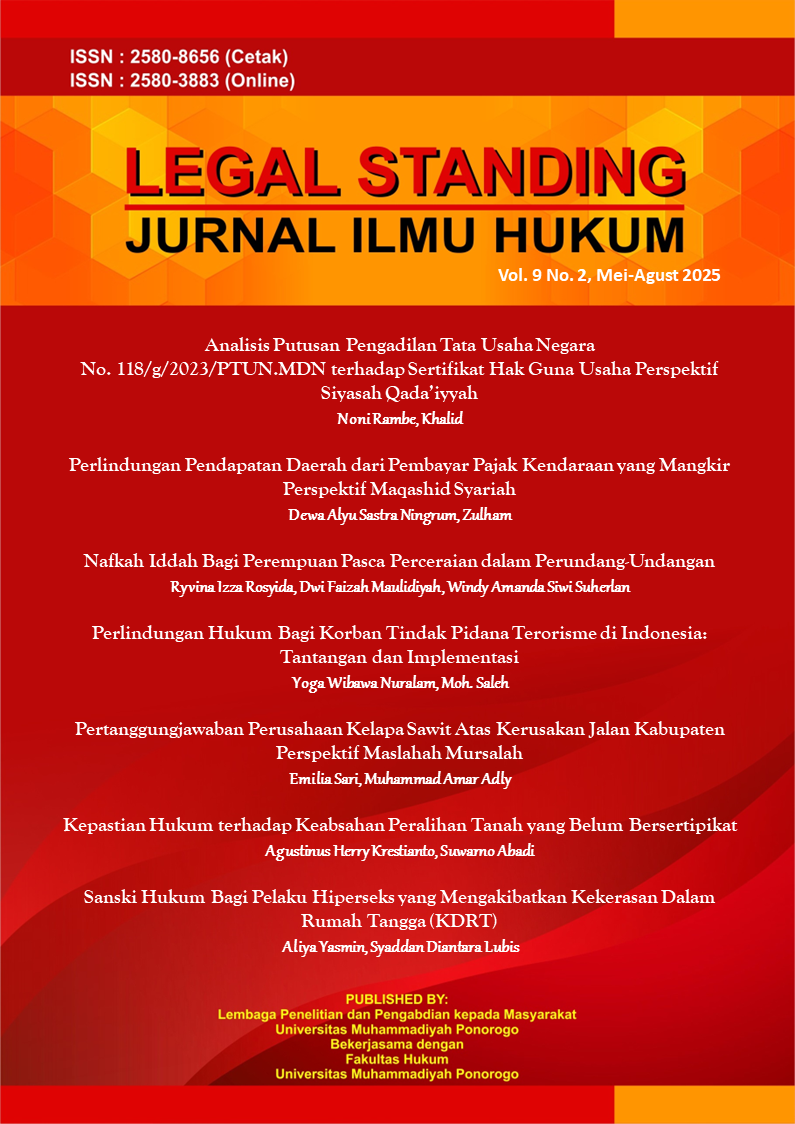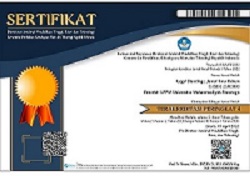Pembatasan Hak Ekslusif terhadap Penggunaan Kata Umum dalam Sebuah Merek
DOI:
https://doi.org/10.24269/ls.v9i2.11773Abstract
Technological advances drive the importance of brands as trade identities. Based on Law No. 20 of 2016, brands with generic words are prohibited, but the lack of clarity in the rules creates legal uncertainty. This study examines the legal issue and evaluates the regulations to support fair trademark law in Indonesia. This study applies a normative legal approach method with analytical descriptive research specifications. This approach aims to explain and describe the events that are the focus of the study, which are then analyzed by referring to primary, secondary, and tertiary legal materials. The results of this study are the Restriction of exclusive rights to generic words in brands, as regulated in Article 16 letter f of the Permenkumham Merek 12/2021, preventing monopoly of widely known terms to protect the public interest and support business competition. However, the lack of a clear classification in Law No. 20 of 2016 creates the potential for legal conflicts. Distinctive power remains a key element, which can be obtained through fantasy words, generic words unrelated to the product, or secondary meanings. Clearer guidelines and evaluation of the mechanism of distinctive power are needed for fair and effective application of the law.
References
Ismoyo, J. D. (2019). Metode Penelitian Hukum “Mendapatkan Kebenaran Berdasarkan Konsep Hukum.†Depok: Rajawali Pers.
Kowel, F. H. (2017). Pelindungan Hukum Terhadap Penerima Lisensi Merek Di Indonesia. Jurnal Lex et Societatis, 5(3). https://doi.org/10.35796/les.v5i3.15575
Rahmatullah, I. (2015). Perlindungan Indikasi Geografis Dalam Hak Kekayaan Intelektual (HKI) Melalui Ratifikasi Perjanjian Lisabon. Jurnal Cita Hukum, 1(2). https://doi.org/10.15408/jch.v1i2.1470
Rojo, G. (2022). Awareness and Strategies of the implementation of the Law on Intellectual Property Rights in the State Universities and Colleges in Western Visayas. International Journal of Science and Management Studies (IJSMS), 208–250. https://doi.org/10.51386/25815946/ijsms-v5i2p121
Sari, N. (2009). Pentingnya Perlindungan Hak Kekayaan Intelektual (HKI) Dalam Era Globalisasi. QISTIE, 3(3). https://doi.org/10.31942/jqi.v3i3.578
Semaun, S. (2016). Perlindungan Hukum Terhadap Merek Perdagangan Barang Dan Jasa. Diktum: Jurnal Syariah Dan Hukum, 14(1). https://doi.org/10.35905/diktum.v14i1.227
Simamora, R., Permata, R., & Sudaryat, S. (2024). Implikasi Penggunaan Kata Umum dalam Pendaftaran Merek Berdasarkan UU No. 20 Tahun 2016 tentang Merek dan Indikasi Geografis. Comserva : Jurnal Penelitian Dan Pengabdian Masyarakat, 4(3), 673–679. https://doi.org/10.59141/comserva.v4i3.1407
Sinal, M., Widaningsih, Muqit, A., Himmah, D., & Sukadi, I. (2023). Penguatan Sentra Hak Kekayaan Intelektual (HKI) di Perguruan Tinggi sebagai Upaya Perlindungan Hukum terhadap Kekayaan Intelektual. Peradaban Journal of Law and Society, 2(2), 184–200. https://doi.org/10.59001/pjls.v2i2.136
Sulasno, S. (2015). Lisensi Hak Kekayaan Intelektual (Hki) Dalam Perspektif Hukum Perjanjian Di Indonesia. Adil: Jurnal Hukum, 3(2), 352. https://doi.org/10.33476/ajl.v3i2.61
Sulastri, S., Satino, S., & W, Y. (2018). Perlindungan Hukum Terhadap Merek (Tinjauan Terhadap Merek Dagang Tupperware Versus Tulipware). Jurnal Yuridis, 5(1), 160. https://doi.org/10.35586/.v5i1.321
Utama, Y., Pertama, R., & Mayana, R. F. (2021). Pelindungan Merek Berbasis Tingkat Daya Pembeda Ditinjau Dari Doktrin Dilusi Merek Di Indonesia. Acta Diurnal Jurnal Ilmu Hukum Kenotariatan, 5(1). https://doi.org/10.23920/acta.v5i1.486
Downloads
Published
How to Cite
Issue
Section
License

Legal Standing : (Jurnal Ilmu Hukum) is licensed under a Lisensi Creative Commons Atribusi-BerbagiSerupa 4.0 Internasional.

.png)

